Category: Health
Keeping our Promises – An Overview of NYF Programming During a COVID Surge
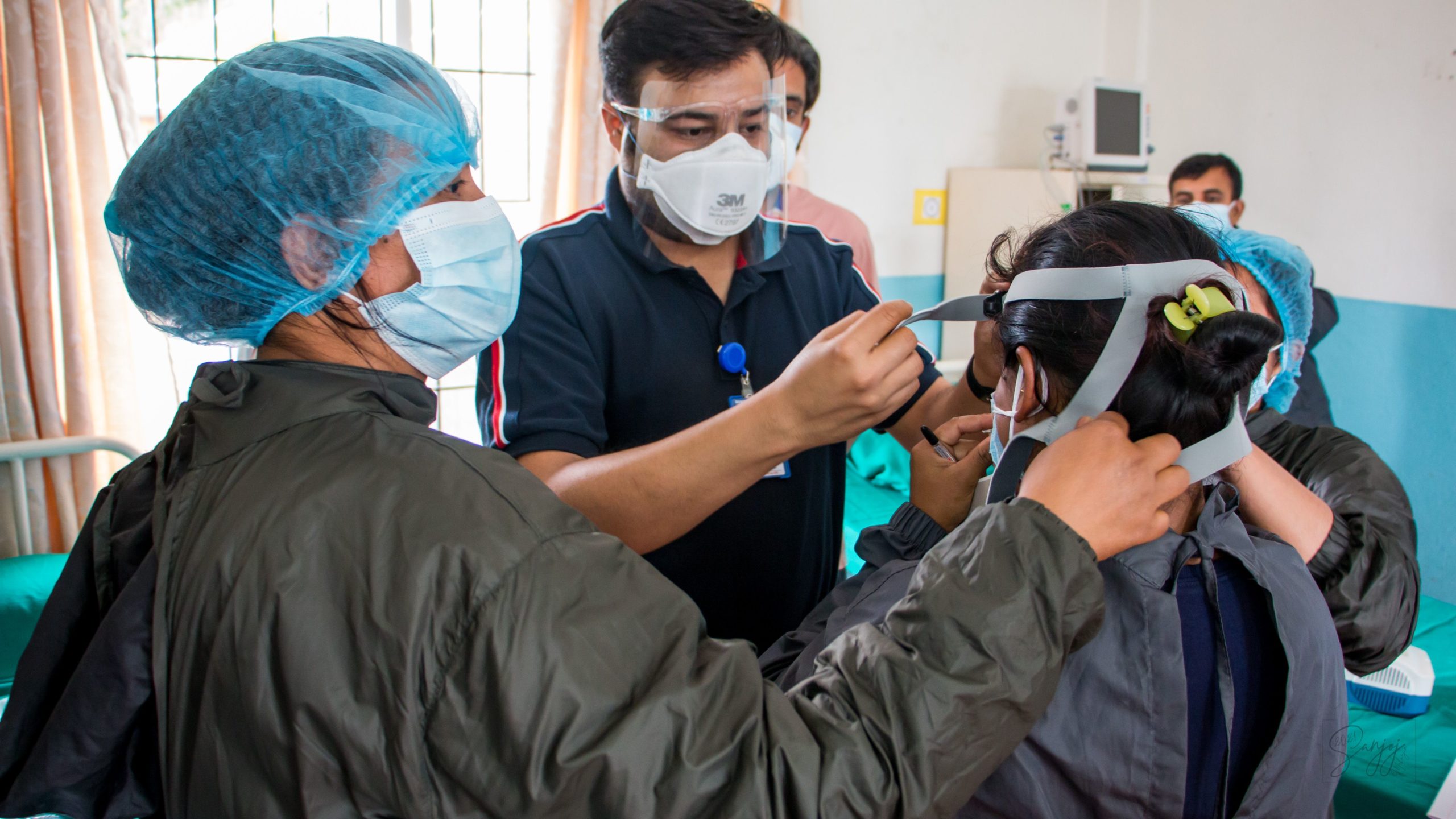
Keeping our promises to the children already in our care is of the utmost importance to NYF in ordinary times. But in these extraordinary times, we’re proving our commitment in ways that build trust, enhance lives, and ensure that the NYF community’s #LoveWorks.
As a follow up to Som’s interviews with the BBC on May 6th and May 24th, our US Team spoke to Som, NYF’s president, on Monday evening (May 24th, 2021), to get a broad update on our programs during Nepal’s unprecedented second COVID wave.
Here’s what we learned:
Regular Programs
When the pandemic first hit in March 2020, NYF pivoted quickly – but those first few months in lockdown weren’t easy! (Click here for our COVID timeline.) Like people throughout the world, our staff members and the children we serve had to think creatively to find necessary equipment, develop safety systems, and share information.
Fortunately, after a year of COVID safety measures, this new lockdown in Nepal is easier for our regular programs to navigate. Som says it was very simple for staff members to “switch gears” back into lockdown-mode.
Olgapuri Children’s Village – After a brief safe window of returning to school outside of Olgapuri campus, the village is now in strict lockdown again. Olgapuri (below) continues to be one of the safest places in Nepal during the pandemic. You may read more about Olgapuri in lockdown by clicking here.

Ankur Counseling Center – Our counselors at Ankur are continuing to work hard from their home offices, providing regular mental health care to the children in our care, staff members, and others within the community. They have been providing extra support during the second wave to individuals in our COVID Isolation Center as well. (Click here for more Ankur stories!)
Olgapuri Vocational School – Most of the courses planned for this time period have had to be postponed for the safety of staff and students, but one vocational course is actually ongoing!
This group of 20 Freed Kamlaris at Olgapuri Vocational School was nearly through their mandatory quarantine period when the government shutdown began. Since Olgapuri is a completely locked down campus, the young women and NYF staff all agreed that they were safer here than they would be if they travelled home to the Western Terai. Their vocational training program is proceeding almost as normal.
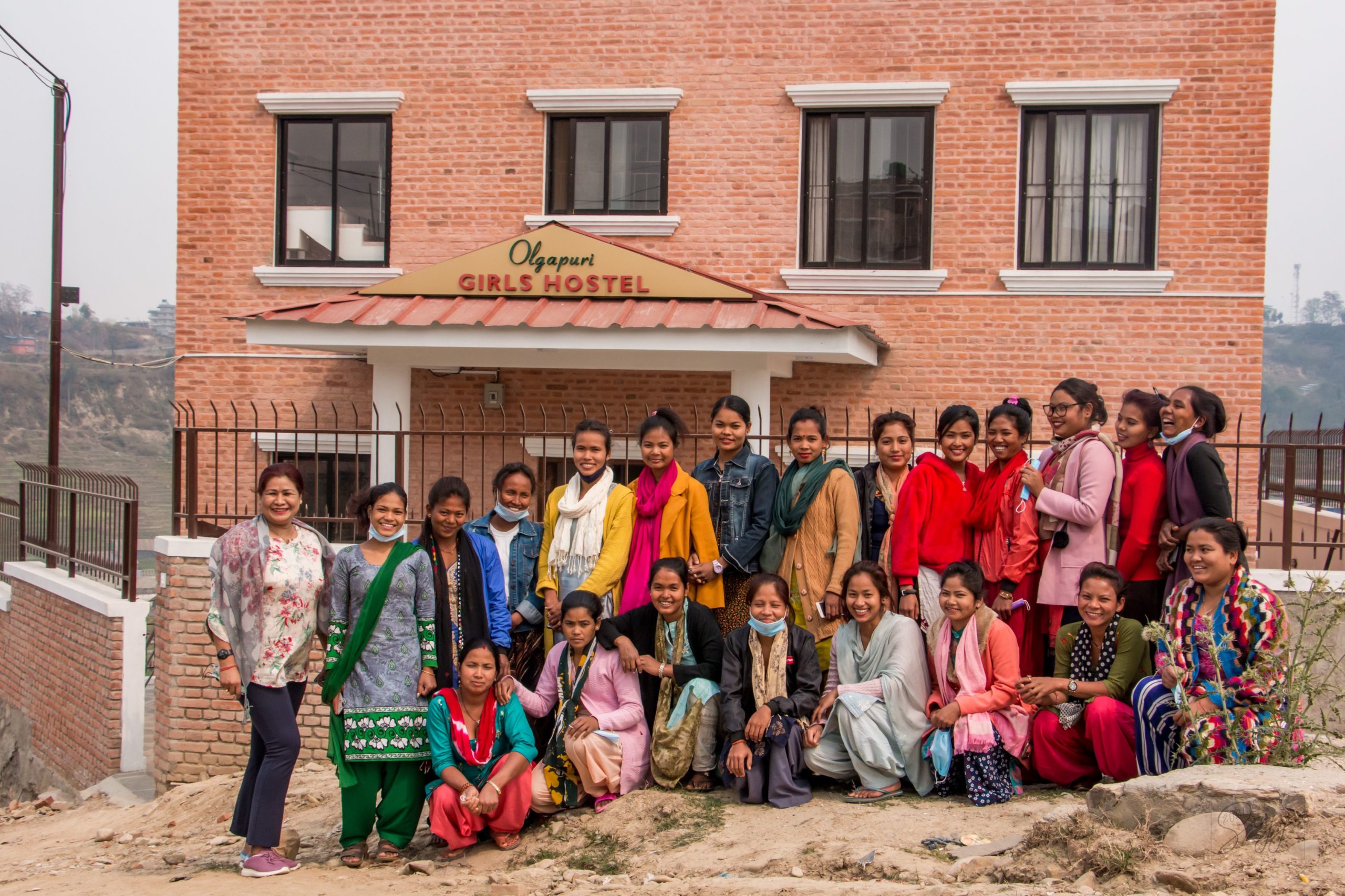
A second program was recently completed in a very remote, isolated village in northwest Kathmandu Valley. The program was well underway when this second surge began, and because the trainer was already in the village with all of the necessary equipment, and because the village is so remote that locking it down was simple, students and NYF staff agreed that this, too, was a safe option for continuing as usual. The new program graduates will be able to put their vocational skills to work once the economy reopens.
As the situation evolves in Nepal, programs like these will be decided on a case-by-case basis, with special care taken to protect staff members and students alike.
Scholarships & Kinship Care – NYF’s team has stayed in regular touch with scholarship recipients and families receiving Kinship Care stipends to ensure they are safe, well-fed, and continuing their education as best they can.
Schools around Kathmandu Valley are now able to provide online learning. The main disruption being experienced by our students is exam scheduling, which has been out of sync for over a year. Final exams across the country will be postponed until it is safe for groups to gather again. This may extend the length of some students’ studies.
Nutrition – NYF’s regular Nutrition staff – those who run the Nutritional Rehabilitation Home in Kathmandu – are currently working completely on COVID response, including Lito for Life and the COVID Isolation Center.
At NYF, we are so grateful for the hard work and dedication that allows these critical programs to continue. Thank you for helping us keep our promises to the children already in our care!
Emergency Programs
Lito for Life – Lito for Life is ongoing. (Click here to learn about this program.) Due to the current surge, no “super flour” is currently being produced, but our stock of already-prepared and packaged Lito is still being distributed, along with other staples like rice and potatoes. To ensure safety, our team members are not making deliveries door-to-door, but we are providing packages to orphanages, children’s hospitals, long-term care facilities, food banks, and other locations where individuals can access this critical resource.
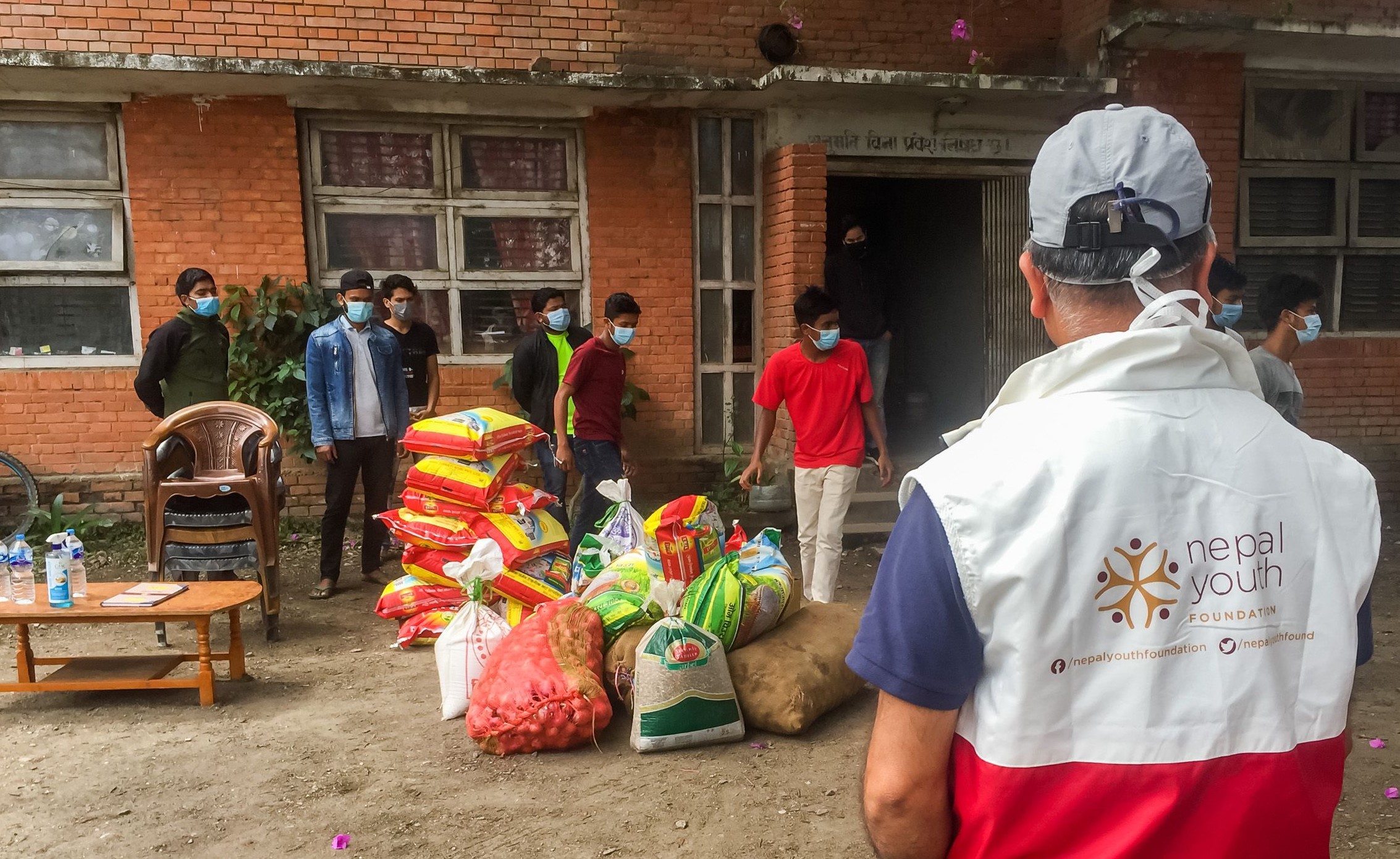
COVID Isolation Center – Our Kathmandu Valley Nutritional Rehabilitation Home and the adjacent New Life Center are being used as a COVID Isolation Center for individuals who have tested positive for the virus and are asymptomatic or experiencing mild to moderate symptoms. The resource is designed to allow individuals to isolate away from their families, to slow the spread. Our patients are coming mainly from orphanages, college dormitories and hostels, boarding schools, and housing shared by multiple generations and families within a tight space.
Most of our patients are children and youth, but we serve adults as well. Our youngest patient so far was an 8-year-old girl from a local orphanage, who was isolating with us to protect her 50 friends at home. Our oldest patient so far was a 73-year-old man. He has recovered and returned home to his family.
Many individuals who are isolating at home do not recognize when their symptoms have become too dangerous – and by the time they reach the hospital, it is too late to save them. At our COVID Isolation Center, patients are under the observation of trained medical professionals who know when an individual needs care in a hospital setting. The ambulance ride to the hospital is provided free of charge.
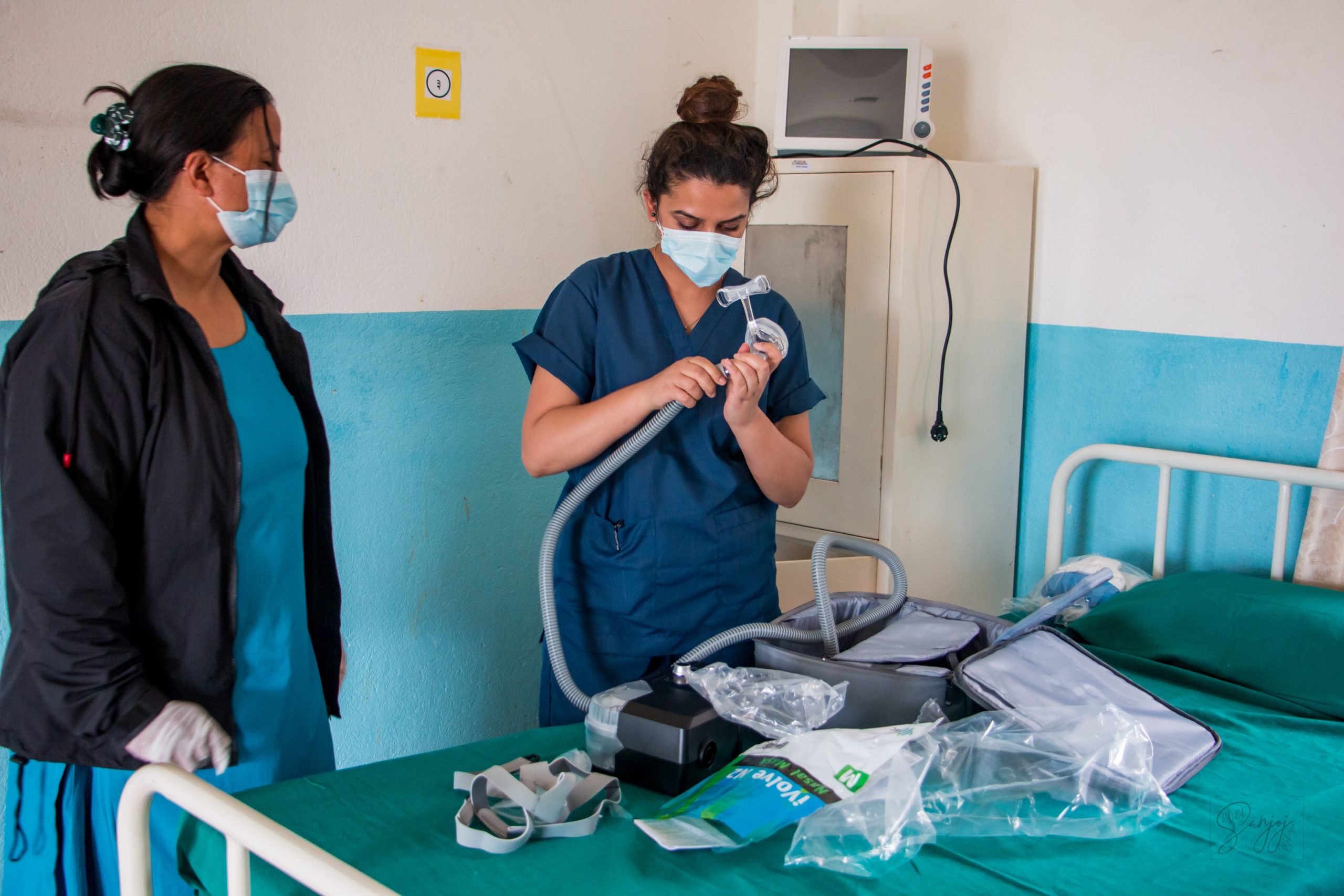
This week, our staff members received special training from a local doctor and his team to ensure that these patients stand the best chance possible as they wait for an available hospital bed to be located. Four beds at the COVID Isolation Center are being set aside for a “High-Dependency Unit” or HDU (above). Patients in need of hospital intervention will be moved to this area and held here, under stabilizing, high-level care and using special equipment, until NYF is certain a hospital ICU bed has been found for them.

We are looking forward to sharing more about this work soon!
What Comes Next?
The situation in Nepal is evolving quickly, and NYF is working to develop solutions as part of the broader Nepalese community. Som is working with government health officials in Kathmandu Valley on ways to support families who are isolating at home. We hope to share more about this soon!
Here is some good news: Som tells us that, thanks to awareness of the oxygen shortage in India, hospitals in Nepal have received a generous outpouring of oxygen resources from around the world. More vaccines are on the way. And aid is arriving from multiple governments, as well as from the UN.
Experts are warning that a third COVID wave may be coming for Nepal in October and November – just in time for the beloved family-centered festivals of Dashain and Tihar. With younger people being impacted by this second wave (most COVID deaths in Nepal are between ages 20 and 50), the concern is that children may be next. NYF’s global team is preparing for this, continuing to develop plans and expertise to meet this moment (and the next) with strength and agility. We are so proud of our team members who are continuing to learn new skills as this crisis continues to unfold.
And we are also proud of our team members in Nepal – house parents, nurses, tutors, instructors, cooks, drivers, counselors, administrators, and more – who are working so hard to continue keeping our promises to the children in our care.
Donations
We at NYF are so grateful for every single thoughtful gift we receive, whether for a specific program, a sponsored student, a piece of equipment, or “our greatest need.” Dhanyabad to everyone who has given! Your generosity is a true inspiration.
In times like these, even if COVID has provided the inspiration for your gift, the most effective way to give is to provide unrestricted funding. Unrestricted funding allows us to aim each dollar with the maximum flexibility, allowing the needs on the ground to drive our responses as the situation evolves. Unrestricted funding also allows us to continue keeping our promises to the children in our care by ensuring that each of our programs is fully funded and can continue as best as possible throughout the pandemic – and beyond.
To make your generous gift, please click here. Thank you so much for ensuring your #LoveWorks for the children of Nepal!
Nepal’s COVID “Humanitarian Crisis is Rising Very Fast” – Som Speaks to the BBC
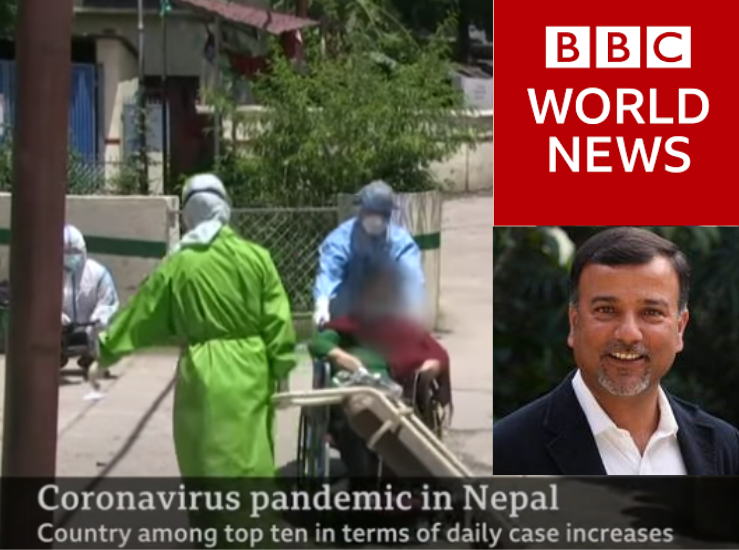
Nepal’s COVID humanitarian crisis is accelerating, with cases surging faster than anywhere in the world. The country has been in lockdown for a month now, and with many individuals passing away at home, the true death toll is difficult to confirm. Comparing the number of confirmed COVID deaths to the number of funeral services highlights this grim disparity.
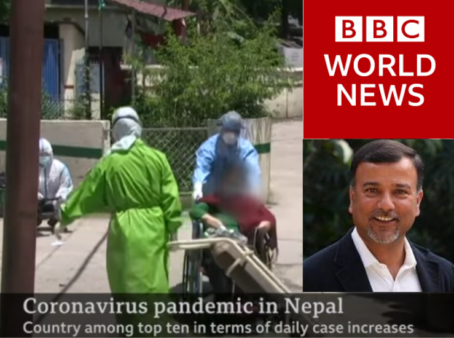
Today, on May 24th, 2021, NYF’s President Som Paneru appeared on BBC World News (link below) to describe the situation – and the urgent needs in his country.
Many thanks to BBC World News for helping to share this message. Other news sources, like The Global Herald, are already sharing the story.
NYF is currently using our Kathmandu Nutritional Rehabilitation Home as a COVID Isolation Center for children and adults with COVID-19 who are not sick enough for the hospital. This resource (pictured below), which includes mental health care and dietician-designed meals, allows them to isolate away from their families, helping to protect their loved ones from the virus.
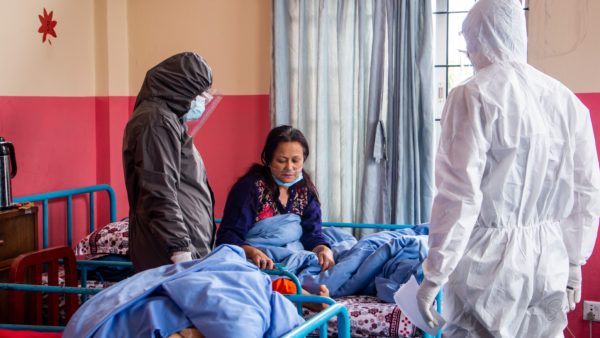
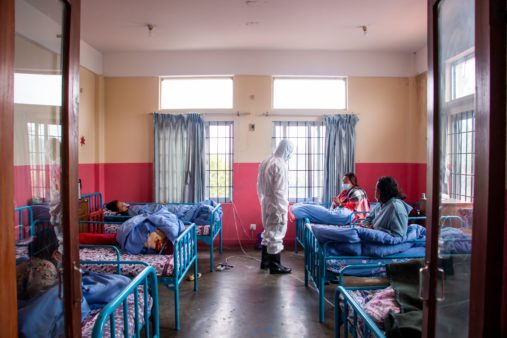
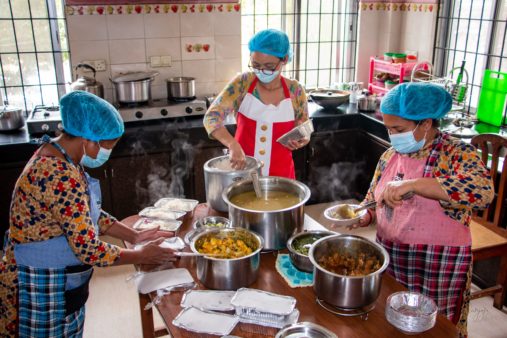
To see what else NYF has been doing in response to Nepal’s COVID humanitarian crisis, click here to view our ongoing timeline.
Please donate now to support our efforts to continue providing Health, Freedom, Shelter, and Education to Nepal’s children during this unprecedented crisis.
You may watch Som’s full interview with BBC World News on the BBC YouTube Channel:
COVID Isolation Centers Provide a Lifeline as Nepal Battles a Surge
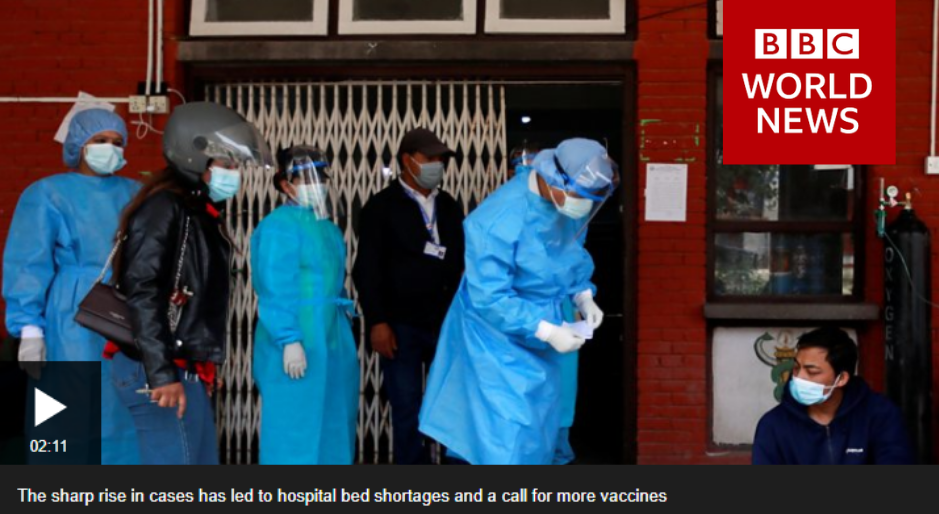
COVID isolation centers are becoming a life-saving necessity for families in Nepal as the pandemic surges through South Asia. Kathmandu is in lockdown once again, with schools closed and hospitals filled beyond capacity.
Nepal Youth Foundation opened our first COVID Isolation Center in our Kathmandu Nutritional Rehabilitation Home on Tuesday, May 4th, and it is already full, mostly with people under the age of 18. Isolation centers provide safe care for individuals who have been infected with COVID-19 and must be isolated from their families, but who are not sick enough to be hospitalized. Our vaccinated staff members are doing all they can to provide high-quality care to these children, working to ensure their safe recovery.
To help us respond to this growing crisis, please make a donation now.
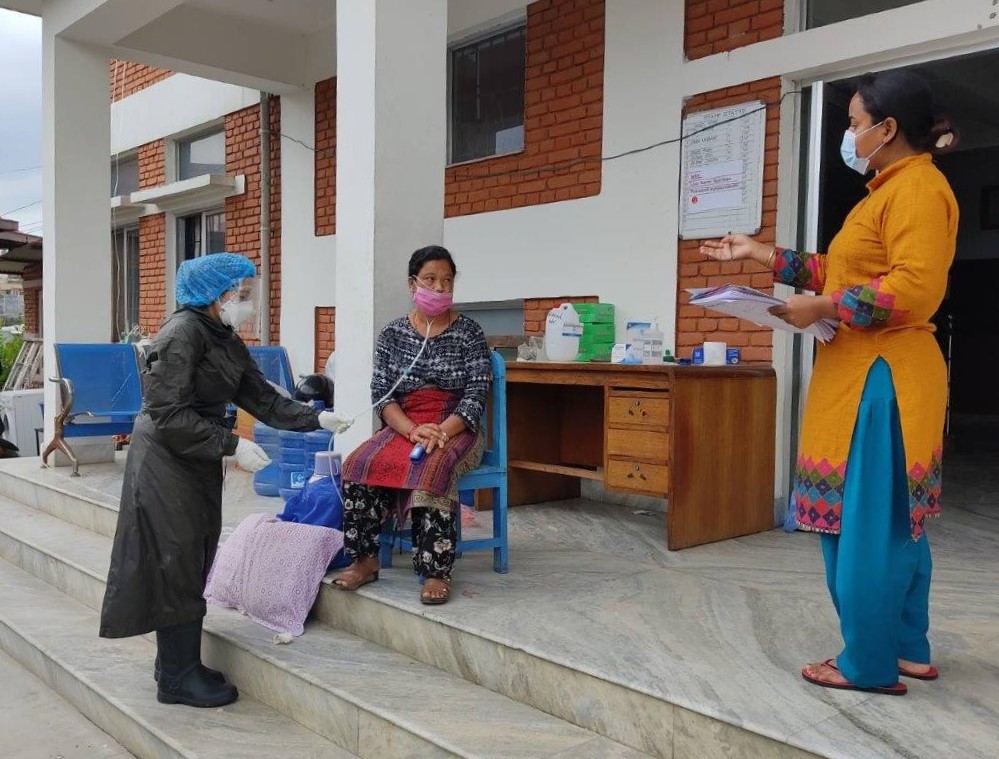
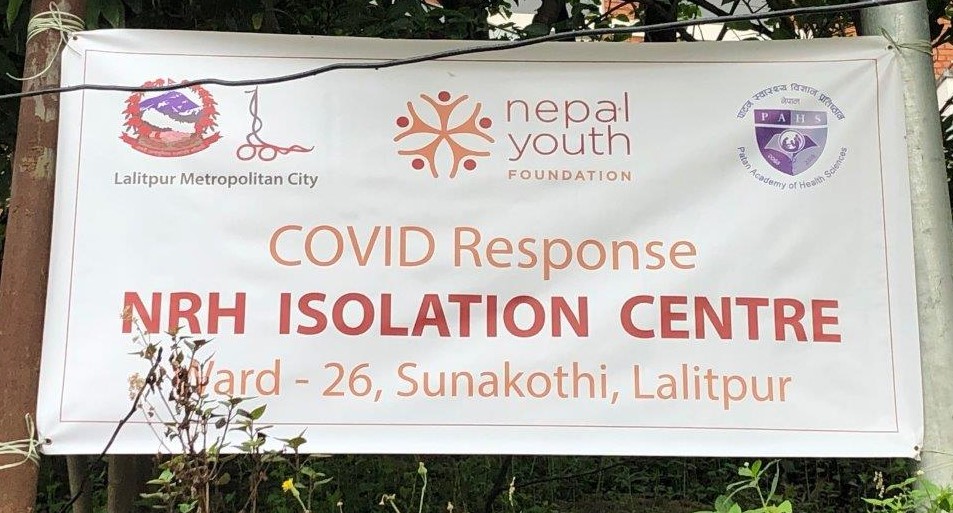


Som Speaks to BBC News

NYF President Som Paneru recently spoke with BBC News about the situation in Nepal. You may listen to the 2-minute interview here, or read the transcription below.
Som: The second wave is causing a great level of distress among the population here. The cases are rising at an alarming rate since the last couple of weeks. People are desperate to find life-saving services like oxygen, hospital beds, ICU, ventilators, etc. So a severe lack of safe isolation places is one of the root causes right now for spreading the virus. Families are living in very congested living conditions, and one family member gets infected and infects the rest. So that’s how it has reached every family and eventually the community. So the situation is very desperate, getting very desperate right now.
BBC News: And what are the hospitals saying in terms of, as you say, the beds. How have they been? Because we’ve been hearing what’s happening in neighboring India. How have people been managing if they haven’t had the oxygen supplies? Has it been the same where they’ve been buying their own cylinders, looking for them to be filled, or has it not yet got to that stage?
Som: We are pretty much going towards the same trail like in India. The families are desperate to secure a cylinder to keep at home. Because there are no places to go in hospitals. Hospitals are turning down new admissions in most of the places. Unless it is a really critical situation. So people are losing lives in the ambulance, traveling from one hospital to another.
BBC News: Can you tell us, please, Som, what your organization has been doing to try and help? What have you been seeing?
Som: Nepal Youth Foundation has recently started an isolation center. A safe isolation place for those people who are infected but are not able to go to hospital, and they cannot stay in the family either. So the isolation center is the first step towards breaking this chain of spreading the virus. So we’ve started one center in Kathmandu, and now there’s a huge demand for opening more centers like this across the country.
Slowing the spread of this virus is critical, and safe isolation centers are an important part of this process in crowded cities like Kathmandu. To learn about NYF’s other COVID responses, please visit our timeline here. And if you are able to donate, please do so by clicking the button below.
Vaccines for COVID-19 Arrive in Nepal!
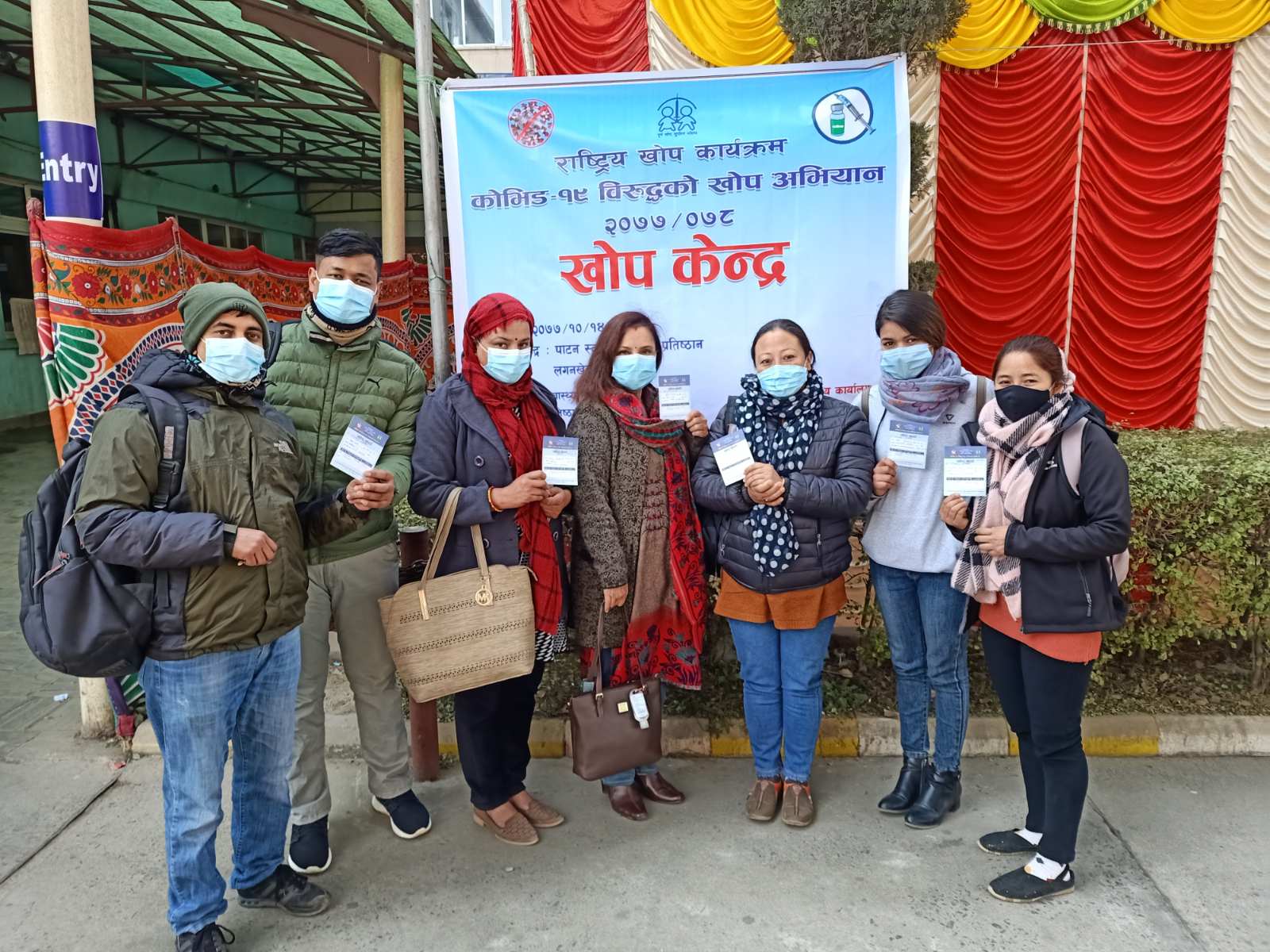
Nepal has successfully secured COVID vaccines through donations from neighboring countries! We’re excited to share that they have started administering the vaccines to high-risk groups and essential service providers.
All NYF staff members at the Nutritional Rehabilitation Home and the New Life center have received the vaccine, and the staff at Olgapuri Children’s Village are in the process of receiving it.
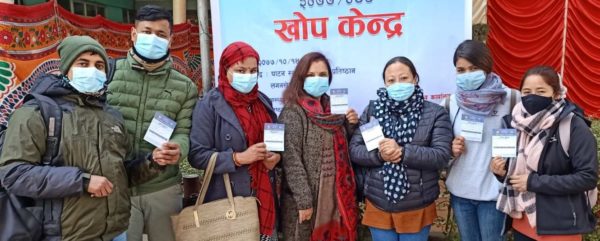
In early February 2021, our Nutritional Rehabilitation Home staff members display their newCOVID vaccine cards.
We will continue the Lito for Life program until this nutritional support is no longer needed in hard-hit communities. But except for Olgapuri Vocational School (which will require extra safety measures), all of our programs have cautiously resumed operations!
Thank you to the NYF community for making all of this possible, and for supporting our work during these difficult times. Dhanyabad!
NYF’s Ongoing COVID Response: We’ve Launched 50 Access to Education Centers!
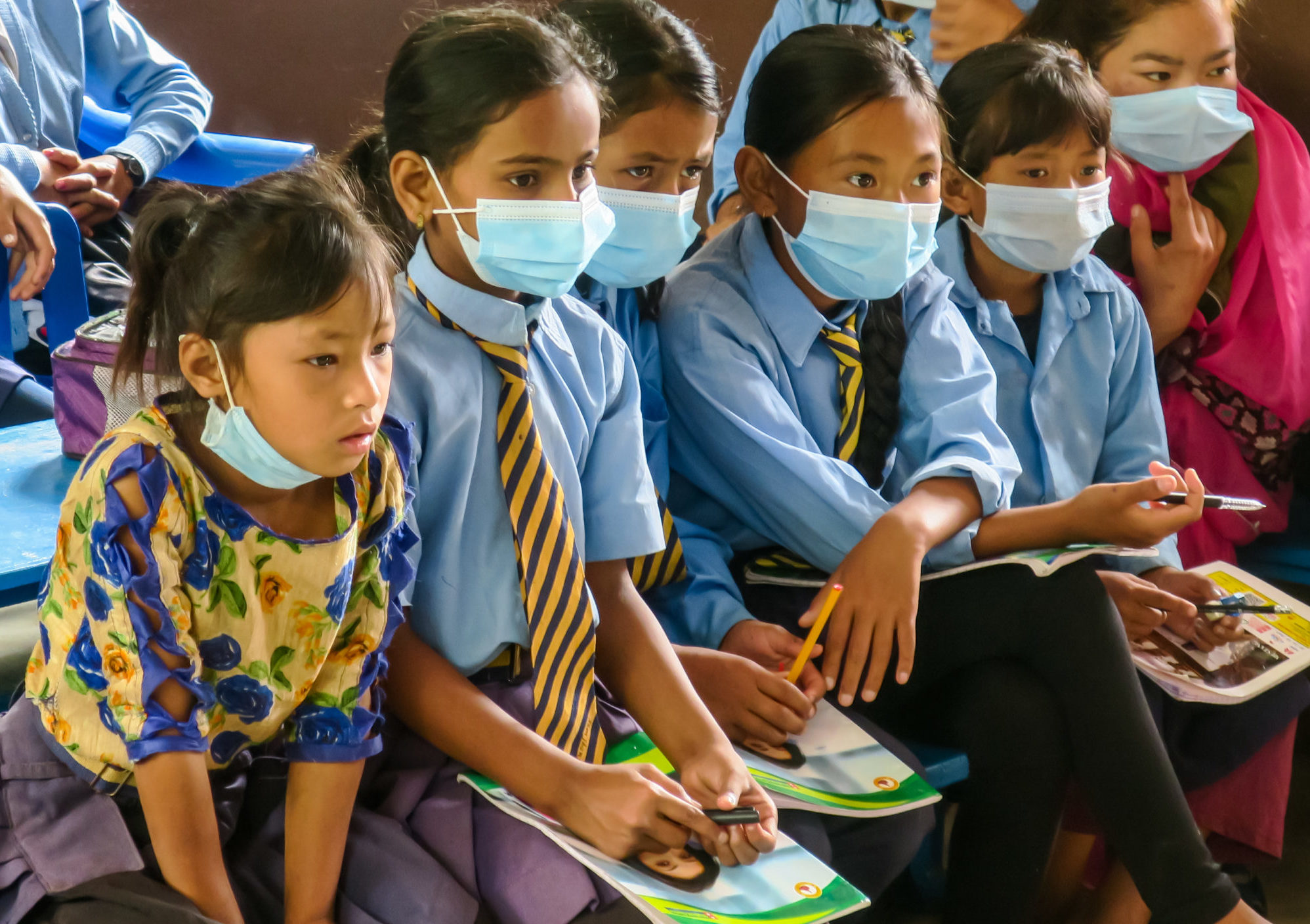
Access to Education is officially NYF’s largest COVID response program yet!
An Update from NYF President Som Paneru
Dear Friends,
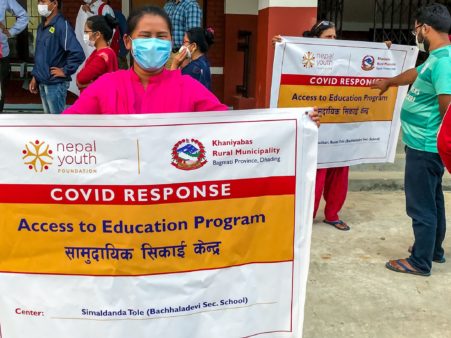
When we piloted the Access to Education program in August, with only four satellite learning centers, we knew we would need to move quickly to keep students in rural Nepal from falling too far behind their peers in digitally-connected regions.
I am proud to announce that as of early October 2020, an additional 46 Access to Education Centers have been established in two rural municipalities in Dhading District: Netrawati Dabjong and Khaniyabas!
With an average of 100 students per satellite center, we’re currently providing 5,000 K-10 students with educational opportunities they haven’t had in six months! Partnering with public schools, this program is also mobilizing 354 teachers who are already on the Nepalese government’s payroll.
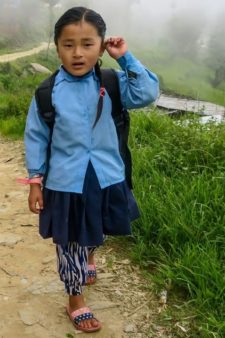
Materials provided for each satellite center include a laptop preloaded with teaching materials linked to Nepal’s country-wide curriculum for each grade, a widescreen television, teacher training sessions, a white board, and reference books.
Classes are held in a building large enough for the village’s children: a women’s group meeting hall, a local health post, even an empty cow shed, if necessary.
And the Access to Education Centers with satellite are quick to establish. The materials provided to the teachers match their regular curriculum. Technical training is provided by NYF when materials are distributed. Once a teacher has returned to their village, they can begin teaching right away.
We hope to continue scaling Access to Education throughout the pandemic. We’re already working on expanding into Gorkha District’s Gandaki Rural Municipality.
Shankar Gurung, a teacher, tells us, “The students are excited to come. The resources provided by NYF have been so helpful and the students are enjoying learning from this new technique.”
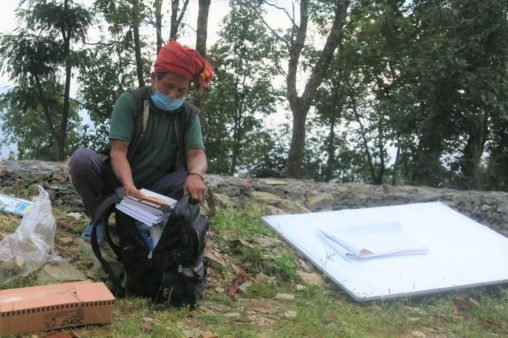
The teachers are excited, too. Nepal’s rural schools haven’t yet gained access to digital technology—until now. As we trained the latest batch of teachers, we met many, like Ram*, right, who had never worked with a computer before. He was delighted to see the familiar curriculum appear on the screen during his training and was relieved to learn how user-friendly the device was. NYF has assured him that we’re only a phone call away if he needs any troubleshooting support.
Packing his new materials up, porter-style, Ram told us he’d traveled two hours on foot from his village to meet us at the school building—the same walk his students used to take every day.
He is thrilled to have a way to get back into the classroom, bringing critical opportunities back into the lives of students he has dedicated his career to educating.
As a former teacher myself, I understand his excitement. Having the resources to bring good-quality education to your community is a precious thing. Knowing the children in your care can keep learning, even during a pandemic, is an incredible relief. It’s something none of these teachers take for granted.
Many of the villages we are serving are very remote—days away from the nearest towns on foot. Even in the best of times, children experiencing poverty drop out of school to contribute to their family expenses through cheap labor, and instances of early marriage are very common for young girls especially.
These learning centers have been critical in helping keep these children in school and minimizing dropouts.
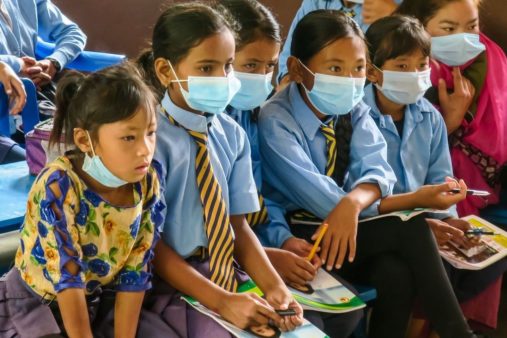
Thank you to each member of the NYF Family who has lovingly supported Access to Education so far!
As COVID-19 continues to surge in Kathmandu Valley, we are uncertain how long school closures will last.
Fortunately, the travel restrictions have protected many of these more rural communities. Children from within a single village must still wear masks, just in case, but among members of their own remote community, they have very limited opportunities for exposure to COVID-19.
We’ve built momentum with this incredible program, and we’re hoping to grow as much as we can in the coming months.
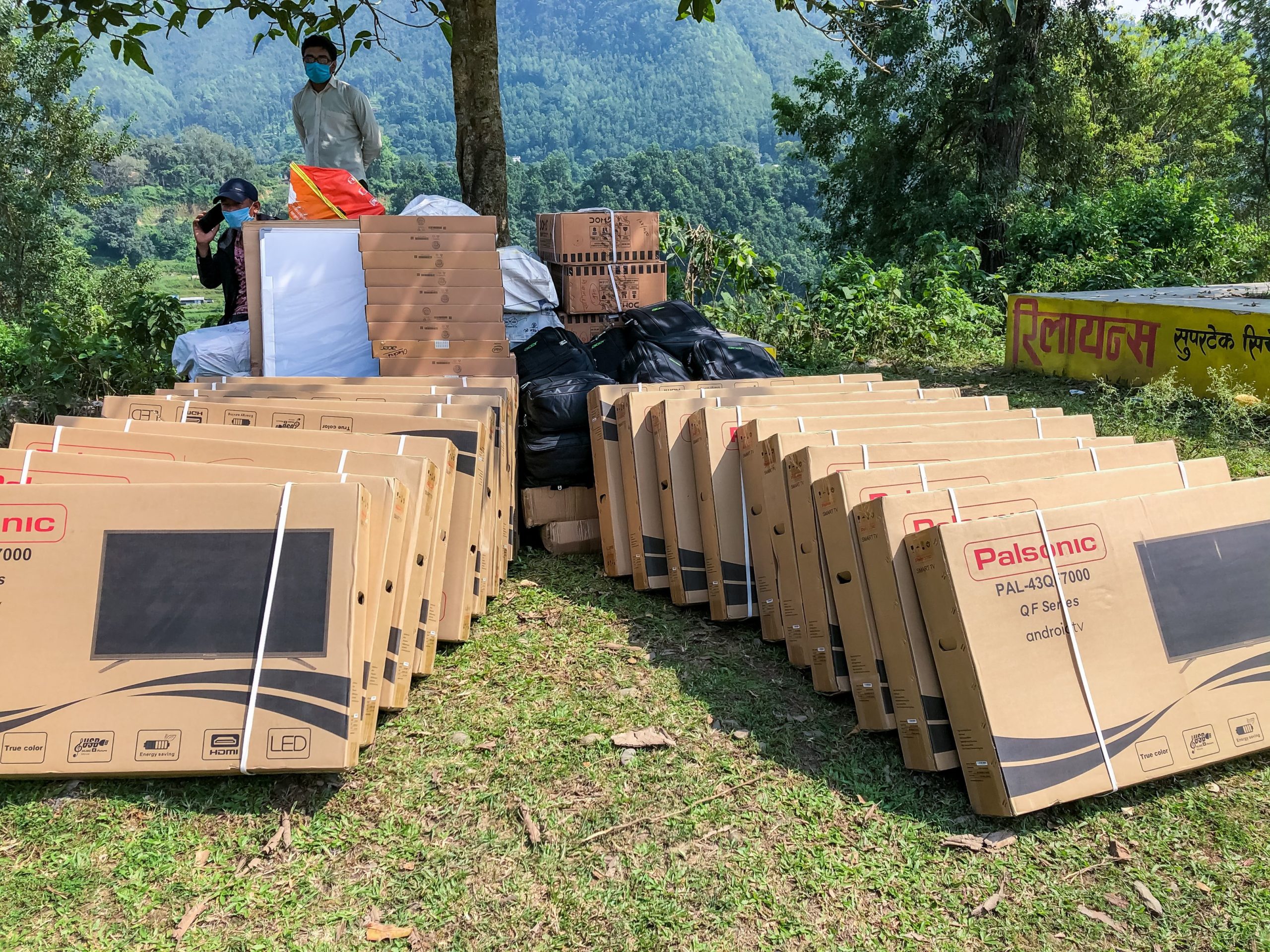
Each learning center in our Access to Education program costs $1,000 to establish and can serve 100 students or more. Please help us provide these vital opportunities to children in rural Nepal by making your loving donation here.
Dhanyabad,
Som Paneru, President
*Names have been changed to protect privacy
Credit card donations via our website are still being processed without delay, as are direct bank transfers (EFTs). If you mail a check to our office (1016 Lincoln Blvd #222, San Francisco, CA 94129) please know that we continue to check the mail twice per week, so there will be a delay in our thank you letter being mailed to you.
If you need to reach us, staff are monitoring individual emails and the email address Info@NepalYouthFoundation.org daily. You can also call us at 415-331-8585 and leave a message, as staff will be periodically be calling in to check voicemail.
Former Kamlari Girls, Now Fight COVID-19 in Nepal
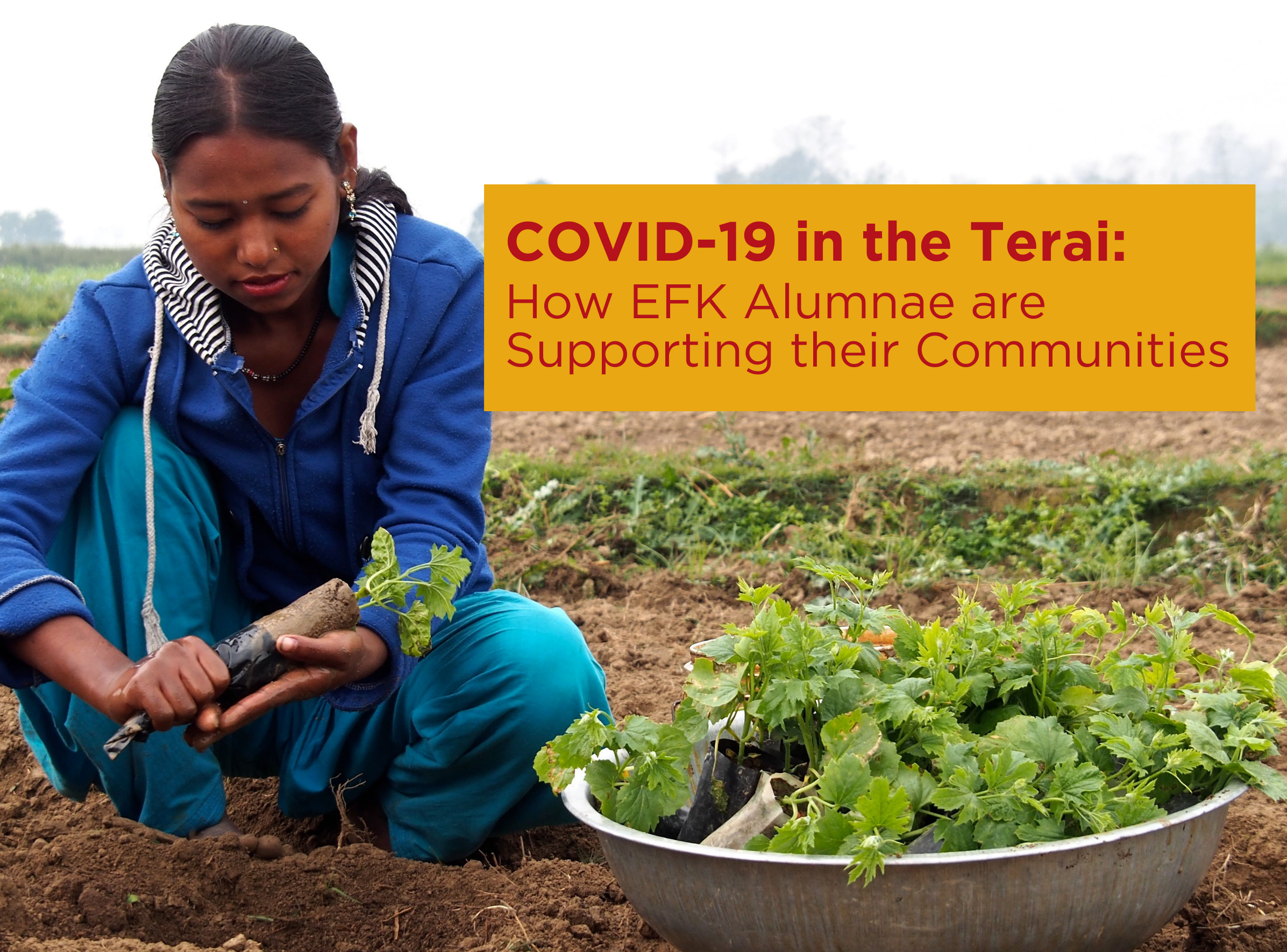
Former Kamlari girls and women help fight Covid-19 in Nepal. NYF is so proud these women are helping with this international crisis.
During COVID-19, in the Freed Kamlari Development Forum’s first months of independence from Nepal Youth Foundation (NYF), the Tharu community in western Nepal has faced new challenges. Because all Tharu communities live along the Nepal-India border, many young Tharu people support their families through work in Indian agricultural or factory jobs. When the pandemic began, these young people were sent away without work, and those without their own farmland have been unable to provide for themselves in the months since. Many small business owners in the region have had to shutter their stalls and workshops to comply with social distancing requirements. The economic impacts of ongoing border closures and travel restrictions threaten to harm the health and education of each family.
Fortunately, with their home-grown NGO established in the area, these communities have been surviving the pandemic together.
Early in the lockdown, the FKDF and our Ankur Counseling Center coordinated to mobilize the trained peer counselors within the Freed Kamlari community. These women were able to reach out by phone to individuals in their villages, providing emotional support and problem-solving guidance wherever possible.

Through their 47 locally operated co-ops, savings groups, and self-help groups, the FKDF has also been able to provide emergency financial relief to families. Twenty years ago, the kamlari practice seemed like the only way for families to pay back the predatory debts accrued in times like these, and sky-high interest rates made those debts nearly impossible to overcome. Agricultural co-ops and financial savings groups run by the community ensure such a thing can never happen again. Now, the Tharu people can provide each other with timely support and manageable interest rates designed to promote financial success in their communities.
Finally, the FKDF is leveraging its strong network of local government partnerships. Due to the incredible work they have already done, and to their connection with NYF, the FKDF is able to coordinate with local- and district-level government bodies to run community awareness programs against COVID-19. They’re hard at work keeping their families, villages, and futures safe.
That’s a special kind of freedom.
NYF is so proud of the work these women are doing during this international crisis. We are proud of the confident and capable leaders they have become. Thank you to each and every one of the NYF supporters who have invested in these incredible women over the past 20 years! Your loving gifts—whether funding piglets in the early days, sponsoring individual educational goals, contributing start-up funds for one of the locally-led co-ops, providing vocational training to hard-working entrepreneurs, or spreading the word within your own communities—have given these communities the ability to meet an unprecedented crisis with amazing resilience.
Dhanyabad! Thank you for your belief in the worth of these girls. The FKDF is proof that your #LoveWorks.
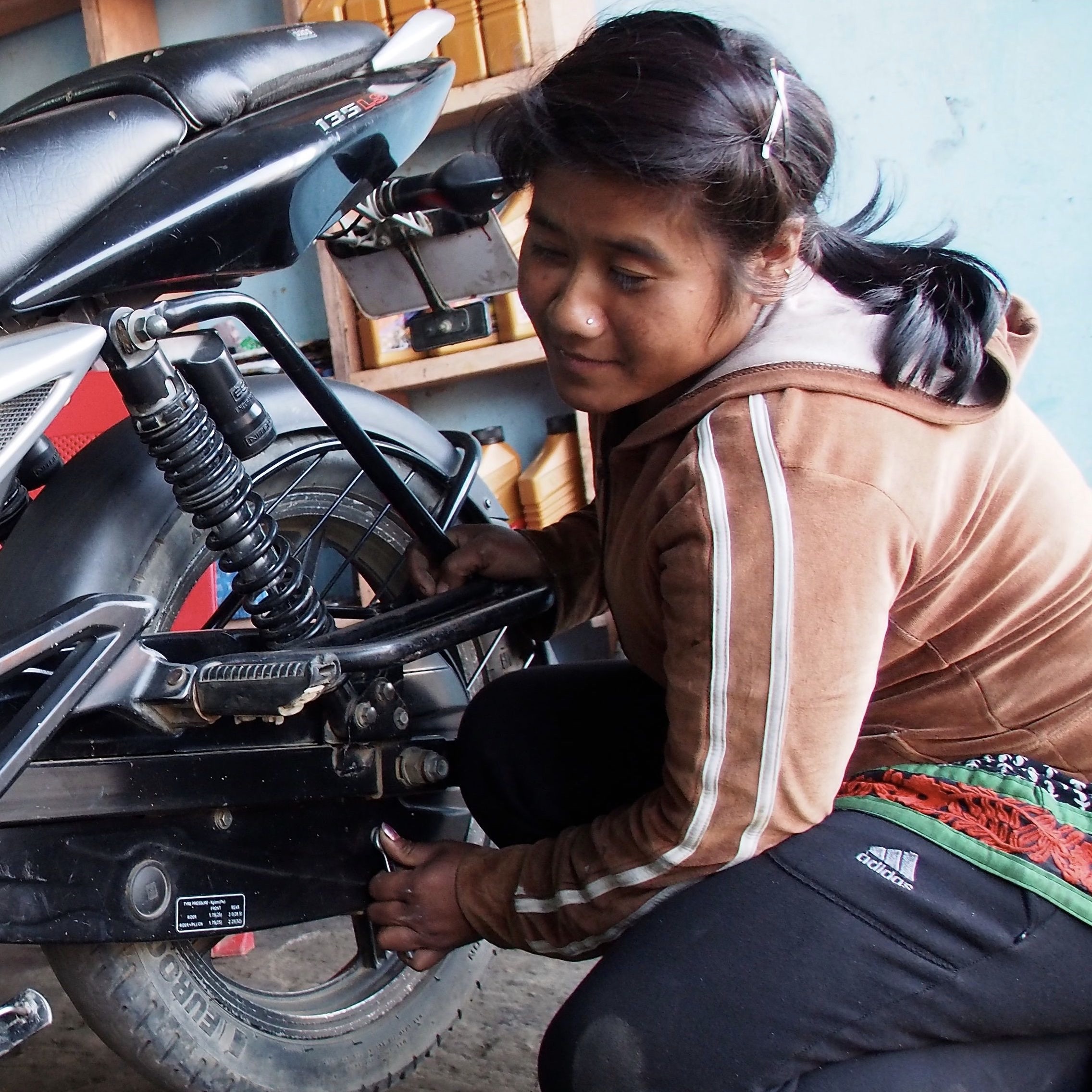
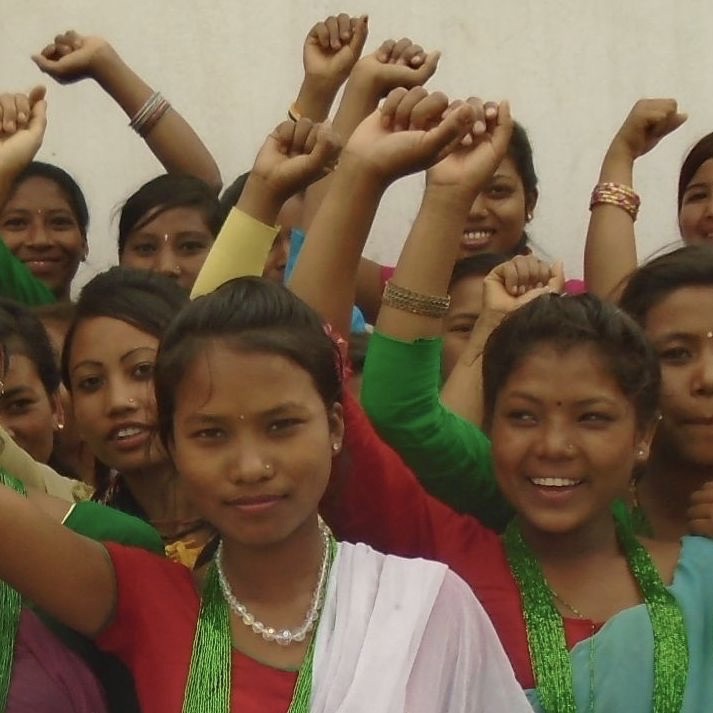
To continue supporting girls freed from kamlari bondage as they establish their own small businesses, you may do so through gifts to our Vocational Education and Career Counseling program. If you’d like to help us prevent early marriage during the COVID crisis, please consider a gift towards Access to Education. Donate here!
NYF’s Ongoing COVID Response: Access to Education
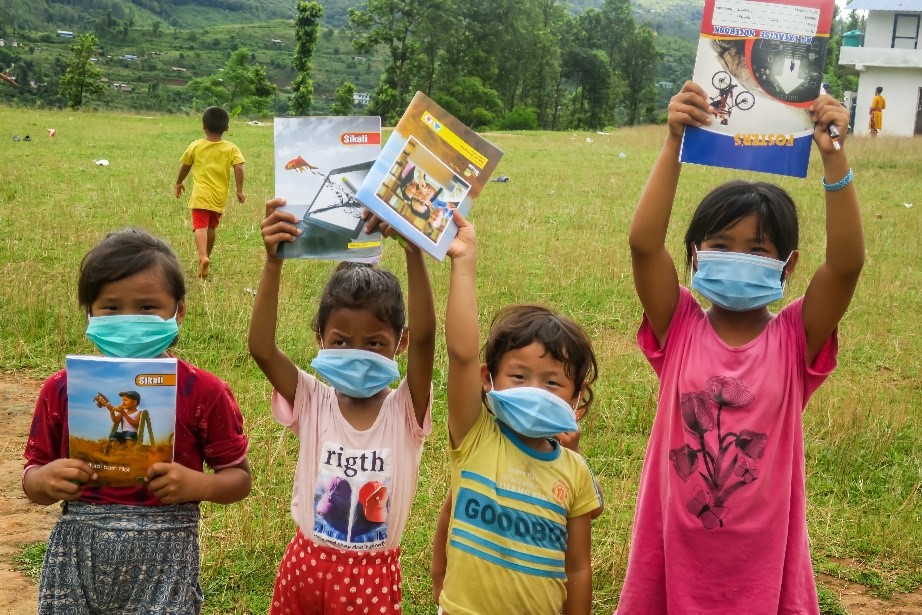
In February 2020, Maya*, an 18-year-old in Dhading District, was excitedly preparing to become the first person in her family to attend college. The oldest of four siblings, three girls and one boy, Maya had worked hard in her studies—often in the face of extreme prejudice—to complete the 12th grade with good marks. Graduation was an exhilarating achievement.
And college promised to open doors to further possibilities.
It’s hard to overstate the importance of these milestones in Maya’s life. Maya and her family were born into the Dalit caste—a minority group in Nepal and India who have historically been considered impure or “untouchable” by those of higher status. This tradition translates into widespread discrimination across all facets of life: education, healthcare, law enforcement, crime, housing, political power, occupational opportunities, and more.
Despite all this, as well as the compounding challenges faced by young women in her community, Maya had completed high school! So, in February 2020, Maya’s hopes were high, and her future looked bright. Her parents, wage laborers carrying bricks and concrete at construction sites, had been successful enough since 2015 to send all four of their children to school.
But in March, when Nepal locked down against the COVID-19 pandemic, construction abruptly halted—and everything changed.
Within a short time, Maya’s family ran out of money for rent and food, and it seemed the only thing to do was to marry Maya off to someone who could feed her. The marriage was held dizzyingly fast, without Maya’s consent—and immediately, she discovered her new husband was both abusive and an alcoholic. Thankfully, Maya realized quickly that her situation was unsafe, and she left to return to her family.
Maya hopes college is still a possibility for her, as well as for her siblings. But with COVID-19 spreading widely throughout Nepal, and with the family struggling to stay housed and fed, all her dreams are in jeopardy. She fears she is forgetting the material she learned last year and will be unprepared for college when schools reopen.
Students throughout Nepal, especially those already facing discrimination and systemic disadvantages, are facing the terrible prospect of losing the educational opportunities they have worked so hard to achieve. Young women are at an especially high risk of early marriage.
As the lockdown continues, Nepalese students at all grade levels—from kindergarten through university—are falling behind. In urban areas, online classes from top-tier schools are running effectively, but these are only accessible by a few. The “digital divide” is widening between students with access to virtual classrooms and those without. This effect threatens to discourage families from sending their children back to school when the crisis has passed—which in turn will limit each child’s future opportunities.
NYF’s earliest programs were designed to help provide a good education for children in Nepal, and we are still committed to that mission. That’s why we’ve launched Access to Education, an innovative program that confronts the current crisis through village-based “satellite learning centers.”
Access to Education equips local teachers with laptops preloaded with digitized government curriculum’s, a wide screen television, and teaching materials. Instructors are trained in Multi-Grade Teaching and Team-Teaching approaches using the available technology and students are provided with Education Kits containing related materials. Available learning spaces are identified in each village—meeting halls, local health posts, even cow sheds, if necessary—to ensure students can learn with enough room between them for social distancing. In this way, students of all grades attend classes in shifts, keeping up with their curriculum and ensuring their minds remain fresh and agile.

Lopika*, age 15, told us, “Schools have been closed for 4 months already and I had forgotten everything. Now I am so happy to be attending classes in the learning center. The teachers are helping me a lot.” Her friend Gavya* added, “I wish I could learn like this even after the pandemic!”
A recent Nepalese television report commended the new program’s success, observing that besides helping students learn, the satellite centers were “creative opportunities for students to interact with friends and teachers, minimizing the psychological distress” from the pandemic. (Full video report)
Each satellite center costs $1,000 to establish and can handle over 100 students! NYF has already been approached by mayors in many rural municipalities hoping to join the program. We hope to open 46 new centers within the next month.
Our earliest sites in Dhading District have received enthusiastic support from parents, teachers, and students alike—and now, NYF needs your help to expand our reach! To join us in supporting the future of more smart young women like Maya, click here to donate now.
*Names changed to protect privacy.
Credit card donations via our website are still being processed without delay, as are direct bank transfers (EFTs). If you mail a check to our office (1016 Lincoln Blvd., Suite 222, San Francisco, CA 94129), please know that we continue to check the mail twice per week, so there will be a delay in our thank you letter being mailed to you.
If you need to reach us, staff are monitoring individual emails and the email address Info@NepalYouthFoundation.org daily. You can also call us at 415-331-8585 and leave a message, as staff will be periodically be calling in to check voicemail.
Lito for Life: NYF’s 3rd COVID Response Program for Nepal
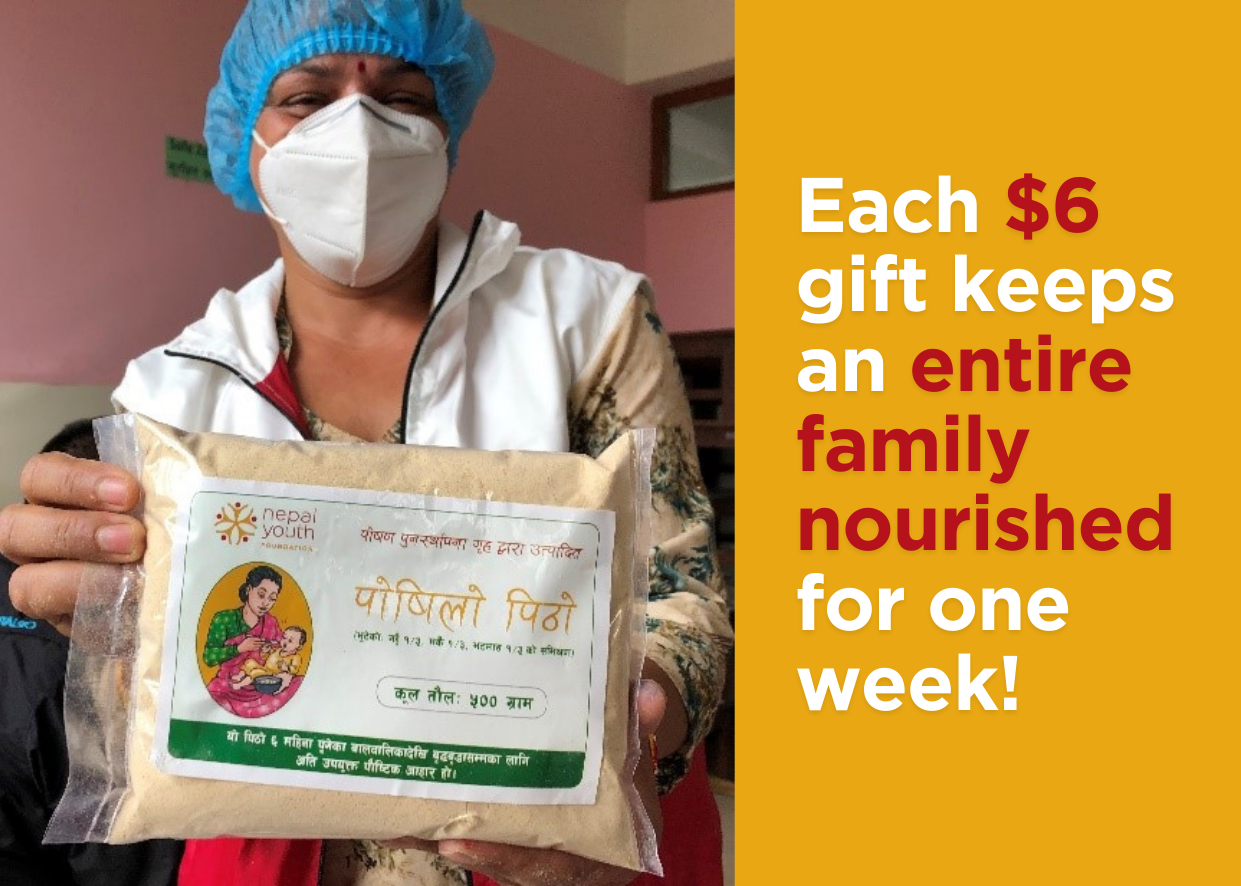
Lito for Life is the the third Covid response program recently launched by Nepal Youth Foundation. Lito is a nutritious ‘super flour’.
As the COVID-19 crisis progresses in Nepal, the economic impacts on individual families are intensifying. Over half of Nepal’s population relies on wages earned day-to-day or week-to-week for labor done outside of social distanced environments, either in Nepal or abroad. The countrywide lockdown, border closures, global recession, and uncertainty about the future are hitting these workers and their families especially hard.
For the months since the lockdown began, these individuals have not been able to work. Forced into tough decisions between rent and food, many parents are going hungry to feed their children. Applications at local municipal offices for food relief are coming from construction and industry workers, daily laborers, employees and owners of small private businesses, and many more, all of whom have been unable to earn wages since March—and the lists are growing by the week. The longer these families are forced to tighten their belts, the higher their risk of malnutrition.
NYF is proud to be part of the Lito for Life response to this crisis. In addition to our new Community Nutrition Kitchens and Emergency Halfway Home for Women, we have now launched a third COVID Response program: Lito for Life.

Meet Radhika, an NYF staff member who is accustomed to manufacturing Lito (or “super flour”) for our regular nutrition programming. The nutrient-rich staple is a critical menu item at our Nutrition Rehabilitation Homes and is distributed to families with children under age 5 at our remote Nutrition Outreach Camps.
Now, Radhika and her teammates are preparing and packaging Lito for a broader use: keeping urban families nourished through the pandemic’s hunger crisis.
Lito is made of roasted and ground corn, wheat, and soybeans, and contains all the nutrients necessary to sustain good health in adults and children alike. Simple to prepare with hot water (or milk, if available) and tasty enough to be accepted and enjoyed by very young children, each 1-kg packet (2.2 lbs) can provide two days of nutrition to a family of four or five. And, if desired, Lito is easily supplemented with other sparing ingredients a family might have on-hand: oil, onions, or spices.
Each packet costs approximately $2 to prepare, including materials, prep, packaging, staff time, and distribution. That means that a gift of $6 can keep an entire family safe from malnutrition for over one week!
Radhika and her teammates have already prepared over 2,000 kilos (4,409 lbs.) of Lito! NYF is working directly with local municipal offices to identify Kathmandu Valley families reaching out for assistance. Each week, we will provide these families with three packets of Lito, ensuring they can maintain basic levels of nutrition at home throughout the crisis.
I wish I knew when Nepal will be able to reopen safely—but I do know that this intervention will keep families strong and healthy, so when the pandemic is over, they can reenter the recovering economy from a place of strength and resilience. That knowledge is comforting in this time of so much turmoil.
In the meantime, Radhika’s #LoveWorks, one packet of Lito at a time. She and I have seen the incredible difference this mindfully produced “super flour” makes in the lives of parents working towards better health for their children, and we know what each packet can accomplish in each household. Radhika and her team are doing important work with each batch of Lito produced.
But she needs your help to keep the work going. Each thoughtful gift of $6 protects an entire family’s nutritional health for one week; $24 accomplishes the same thing for a month. Imagine how much a healthy community of one hundred families can accomplish together. Please help us put the NYF Family’s tradition of love to work today by making your thoughtful online donation here.
Dhanyabad,
Som Paneru, President
Credit card donations via our website are still being processed without delay, as are direct bank transfers (EFTs). If you mail a check to our office (3030 Bridgeway, #325, Sausalito, CA 94965), please know that we continue to check the mail twice per week, so there will be a delay in our thank you letter being mailed to you.
If you need to reach us, please email NYF. Please feel free to give us a call and leave a message, as staff will be periodically be calling in to check voicemail.
Learn more about how Nepal Youth Foundation makes real change possible in Nepal on our Programs page. Read our latest newsletters or be the change and donate to NYF today.
Emergency Lifeline Halfway Home for Women, A Covid Response by NYF
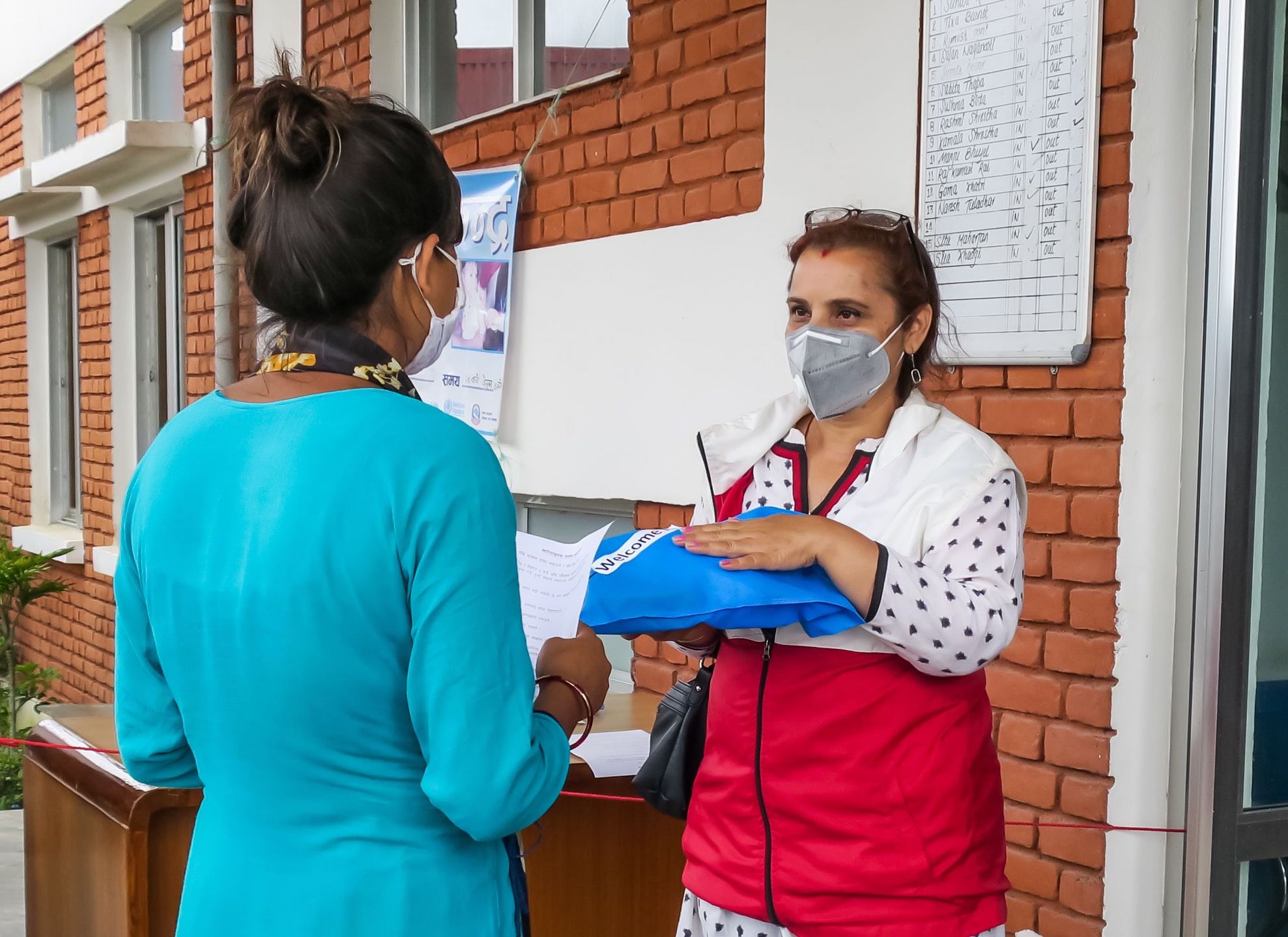
Emergency Lifeline Halfway Home for women, is another Covid Response program developed by NYF.
When we at NYF realized back in March 2020 that COVID-19 would be coming soon to Nepal, our emergency response team in Lalitpur made the difficult decision to pause the normal operations of our Nutritional Rehabilitation Homes.
Now, our Kathmandu Valley NRH is being put towards a different, critically important purpose: a “Women Only” and “Women Friendly” emergency quarantine facility. NYF is being lauded by the Nepalese government for offering this valuable service, and for doing it with our own funding. Pictured below, Sunita, the manager of the NRH, begins the intake process for one of the first temporary residents of the facility, Bilhana (name has been changed), age 26, who was working abroad when the lockdown began and has been stranded outside of Nepal for months. We are proud to welcome her home.
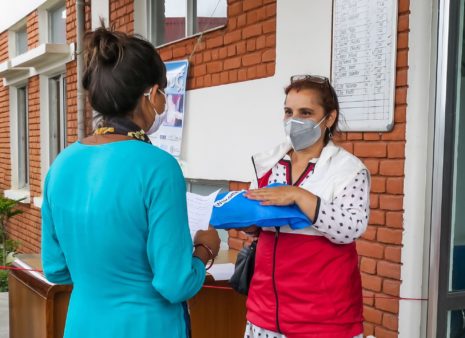
Nepal’s country-wide lockdown was successful in slowing the spread of COVID-19, but now the virus is spreading more widely. According to international virus trackers, there are now more than 10,000 confirmed cases in Nepal, with 10,000 more swabs awaiting test results. The Nepalese government is predicting an increase to 50,000 cases within the next month, and the actual number of cases is certainly much higher than is known.
In our years working in Nepal, serving communities grappling with deep-rooted societal problems as well as those impacted by natural disasters, we have learned the power of love in the most daunting of moments. By now, we all know very well the dangers posed by COVID-19. But as we work day-by-day to develop and launch our COVID-19 programming, the NYF team fills me with hope.
This past week, NYF staff member Amrit (pictured below) transported our first seven quarantine guests to the NRH. Each woman, like Bilhana, has spent the past several months stranded abroad, unable to work due to lockdowns throughout the world. The Nepalese government has finally been able to rescue them and bring them home.
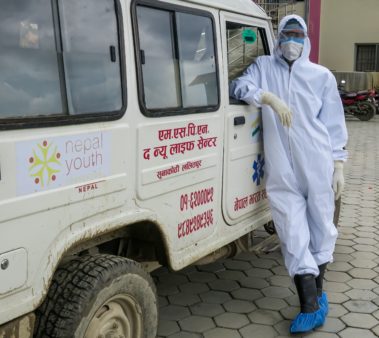
At this time, the NRH is not housing patients sick with COVID-19. Instead, we are providing temporary care for women and children who have been traveling abroad and cannot return to their home villages due to the 14-day quarantine requirement and the continuing travel bans within Nepal. In the coming weeks, we will also be housing women needing healthcare for ailments not related to COVID-19. We anticipate serving a number of pregnant women during this time, providing a safe, stable location for them as they wait for their children to be born.
Below, Heena (name has been changed), age 24, breathes a sigh of relief, looking at the beautiful Kathmandu Valley landscape in a restful moment. Here at the Kathmandu Valley NRH, she will have a bed, the company of other women who speak her language, hot nutritious meals, access to healthcare, and comfortable space for quarantining as her country moves forward.
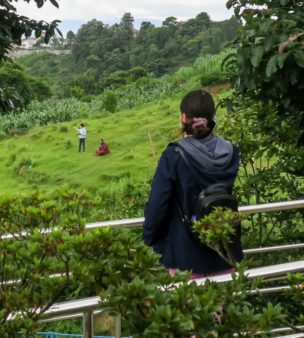
At NYF, we are honored to be equipped to offer this service. We are grateful for the many loving donations that built our NRHs—buildings we never imagined would be used for this purpose, but which have prepared us for this difficult moment in world history. Thank you.
Keeping this program afloat will take work, however. Our staff members need PPE to ensure the highest levels of safety for the women in our care. Food costs will continue to rise, as will the routine costs of running a facility like the NRH: electricity, water, gasoline, cooking fuel, and incidental repairs. We will need masks for our guests, soap, hand sanitizer, linens, and more, all of which will be provided in a Welcome Kit upon arrival. In a crisis impacting the entire world, NYF needs you as much as it ever has—perhaps more.
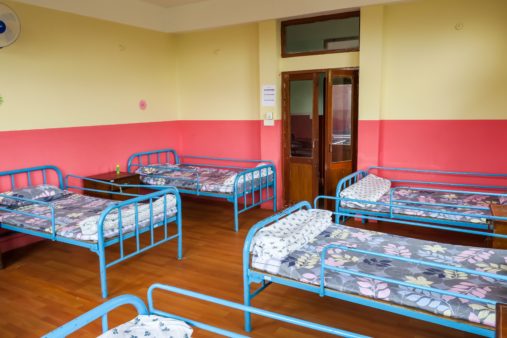
As we work together in the coming weeks and months, we can prove how much #LoveWorks. Each thoughtful gift supports the health, safety, and wellness of women and children experiencing catastrophic instability during this worldwide crisis. If you would like to help support women thorough our Emergency Lifeline Halfway Home or another NYF program, please make an online donation today.
Dhanyabad,
Som Paneru, President
Credit card donations via our website are still being processed without delay, as are direct bank transfers (EFTs). If you mail a check to our office (3030 Bridgeway, #325, Sausalito, CA 94965), please know that we continue to check the mail twice per week, so there will be a delay in our thank you letter being mailed to you.
If you need to reach us, please email NYF. You can also call us and leave a message, as staff will be periodically be calling in to check voicemail.